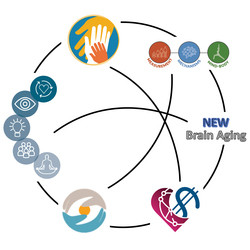Learn About Our New Collaboration: The Network for Emotional Well-being
February 24, 2022

Beginning in early 2021, the Greater Good Science Center’s (GGSC) founding Faculty Director Dacher Keltner and Science Director Emiliana Simon-Thomas have been collaborating closely with leading researchers from UCSF and Harvard to advance the science of emotional well-being. This UC Berkeley, UCSF, Harvard team, called The Network for Emotional Well-being: Science, Practice, and Measurement, is one of six teams nationwide (including the University of Alabama, University of Michigan, University of Connecticut, Rochester University, and the University of Wisconsin). With $3.13 million in funding from the National Institutes of Health, the projects from all of these sites are working together to foster conceptual consensus and enhance synergy across studies that aim to characterize the origins, predictors, drivers, and beneficial outcomes of emotional well-being.
The key role that the GGSC is playing in this project is to help promote rigorous studies of interventions for strengthening emotional well-being, drawing from our comprehensive catalog of research-backed activities, exercises, and practices called Greater Good in Action (GGIA). The aim is to establish a clearer picture of which practices, activities, or exercises for enhancing emotional well-being are most effective, and for whom. In other words, while there is a long list of interventions that have been shown to improve different facets of emotional well-being (e.g. positive emotion, life satisfaction, meaning and purpose), deciding which to do, how often, and for how long can be guesswork.

The goals of this nationwide team of teams also include characterizing the impact of financial burden on emotional well-being, understanding the neural systems, pathways, and patterns of activation associated with emotional well-being, documenting the ins and outs of family well-being, and discovering the most promising opportunities for increasing emotional well-being at individual, interpersonal, and collective levels. Each team is conducting their own research on emotional well-being while also offering a range of different funding opportunities for other scientists who are interested in incorporating emotional well-being into their scope of work. Examples include research grants for pilot studies, ongoing research, or analysis of existing data and fellowships to cover the costs of training and development of key research skills.
“With so many different terms out there tied to human happiness, and an absence of deeper emphasis on the role of emotion, it’s really exciting to be part of this collaborative effort to unify and rally the field around this idea and science of emotional well-being,” says Dr. Simon-Thomas.
Overall, this network for emotional well-being hopes to raise global awareness of the meaning and importance of emotional well-being, and provide the scientific community as well as policy makers with tools for evaluating and strengthening it.
The Network for Emotional Wellbeing was established in 2021 and is funded by the National Institutes of Health (U24AG072699).